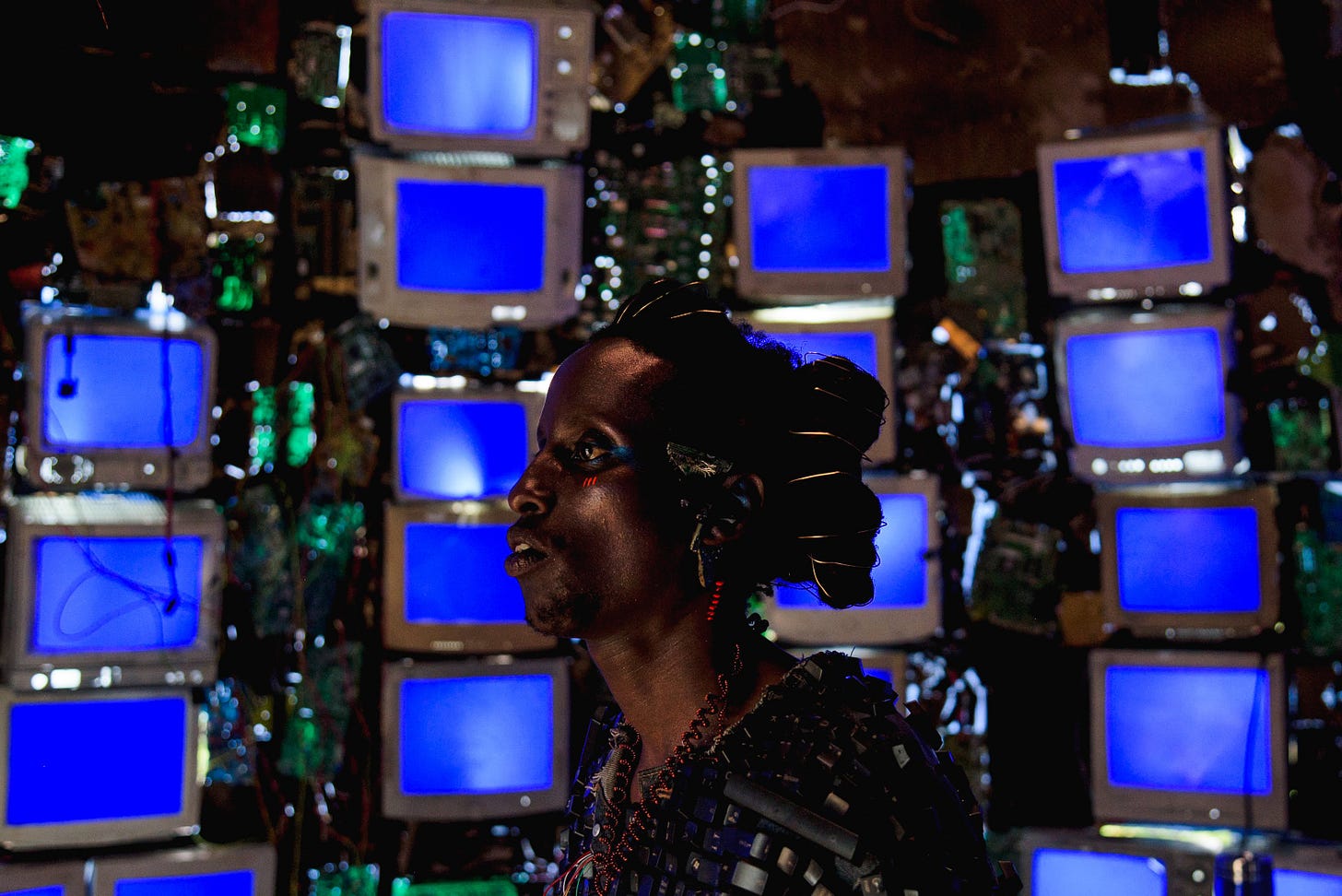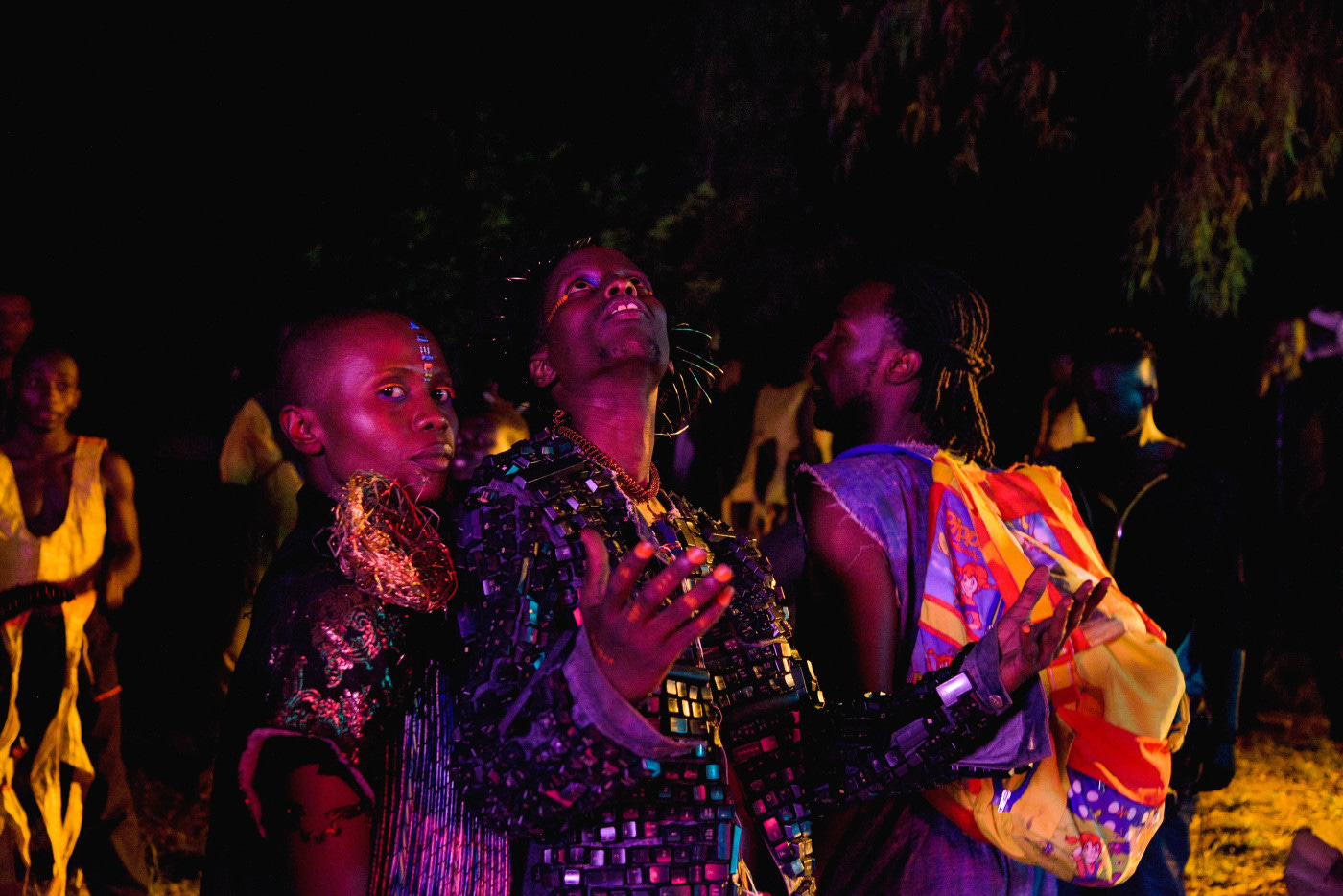Directed by Anisia Uzeyman and Saul Williams
Rwanda/France, 2021
“I was born in my 23rd year. My first breath, just before the war, led to 22 years of what my aunt called our ‘after life’, and she thanked God for every single day. And me… I was a good boy”
This is the beguiling statement that opens Neptune Frost, a genre-defying film that is challenging to define: a kind of Afrofuturist opera draped in a techno-steampunk aesthetic.
Imaginative, inventive and vibrantly visual, Neptune Frost is the product of a collaboration between writer-musician, Saul Williams, and Rwanda-born artist and cinematographer, Anisia Uzeyman. Set in Burundi, watching this film is a heady and at times hallucinatory experience, but underneath the mesmerising images the film-makers grapple with issues of colonialism, exploitation, environmentalism, and gender.
We have two parallel but intertwined stories: the first involves the young man, Neptune, who spoke those opening lines. Following the funeral of his aunt he violently puts an end to the predatory ambitions of the village priest and has to get out of town. On his escape he undergoes an astonishing transformation. We next see him striding across the landscape in a lush red dress: he is intersex (Neptune is played by two actors, Elvis Ngabo, then Cheryl Isheja).
The second thread follows Matalusa (Bertrand Ninteretse) working in slave-like conditions in a coltan mine.
Coltan: a vital component of most electronic devices today, but linked to human rights abuses, child labour and large-scale environmental degradation. The world’s largest exporter of coltan is Rwanda but much of it is smuggled from the Democratic Republic of Congo.
Matalusa’s brother, Tekno, digs up a large piece of the ore and holds it aloft entranced. He is struck down and killed by a security guard. After burying his brother Matalusa flees the mine. So we have two runaways, and both are called upon in their dreams by a Pied Piper-type figure, the Wheel Man. Wearing a headpiece of whirling spokes, he whispers to them as they sleep, “Hack…Hack”: inviting them both to join to an anti-authoritarian collective of Hackers who are working to foment a revolution. They want to bring down the oppressive government, here known as the Authority.
The Hackers greet each other with the password, ‘Unanimous Goldmine’ – a cryptic yet optimistic slogan, and their membership includes the allusively named Innocent, Memory, and Psychology. Their aim? To foster free thinking by disrupting the Internet and social media.
The story of Neptune Frost is more elusive than this linear narrative allows. Like Inland Empire, Neptune Frost really is cinema as experience and a singular one at that. A surreal and captivating collage of visuals, text, and glitch aesthetics, as well as computer generated images play across the screen interrupted by set-piece musical numbers that call back to 30s Hollywood.
Saul Williams said that he started the project originally as a basis for a graphic novel and musical and it shows: the costume designer, Cedric Mizero, combines discarded computer monitors, phones and electrical cables with richly coloured African designs. Matalusa dons a cloak covered entirely with black keys from a desktop keyboard, while the police wear fluorescent pink shirts with wire mesh face guards.
The film’s language is a patchwork quilt of Kinyarwanda, Kirundi, Swahili, French and English (yes, it does have subtitles), and in his soundtrack Williams mixes African beats with modern electronica and comes up with a pulsing rhythm that echoes George Clinton’s One Nation under a Groove and the jazz musician, Sun Ra. His lyrics at times inspired, do at times drop into lumpen cliché: ‘Fu*k Mr Google’.
When Neptune and Matalusa’s paths finally converge, their connection plays havoc with the Authority’s weaponised worldwide web (parallels here with The Matrix). Will they succeed in bringing the system down? You will have to watch it to find out.
Neptune Frost has many targets in its sights: big tech, drone warfare, conflict minerals, and capitalism. You might argue that the filmmakers overreach in their ambition, but this is the film Black Panther could have been: provocative, adventurous, and unafraid to make mistakes. At one point Neptune breaks the fourth wall, literally presenting a middle finger which takes up the whole frame: a take-home message for the Global North.
Liked Neptune Frost, felt a bit like watching a theatrical musical, especially the costumes - T
West End Musical? More like Year 6 play. Can see what they were attempting but it didn’t work for me - C
The whole vibe took me back to club nights at the Africa Centre, Covent Garden in the 80s - S
Reids’ Results (out of 100)
C - 62
T - 74
N - 70
S - 78
🎁 ❄️ 🎁 ❄️ 🎁 ❄️ 🎁 ❄️ 🎁 ❄️ 🎁 ❄️
A ReidsonFilm extra: And so this is Christmas. Well, it is in London where on the 2nd November the Xmas lights were switched on and the supermarkets are already overflowing with assorted festive tat. As our Xmas gift to you, dear readers, we thought we would offer you the opportunity to submit a film to undergo the ReidsonFilm analysis. Only two requirements: the film should bear some relation to the festive season and it has to be available for screening. Drop your recommendations by clicking on the comment box below and we’ll make a selection in a few weeks.
Coming next… Woman of the Dunes(1964)









Female Trouble: "Fuck you and fuck Christmas, I want my cha-cha heels!"